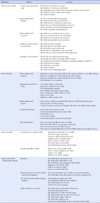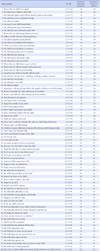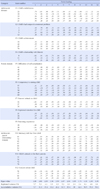Abstract
Purpose
This study was done to develop the scale to measure stress in parents of adolescents for primary mental health care providers such as school nurses who work with adolescents and their parents.
Methods
The study design for the scale included qualitative and quantitative methods. Qualitative data from in-depth interviews with parents were analyzed using content analysis methodology. Quantitative data were collected from 581 parents with adolescent children in grades 7 through 11 from 6 different middle and high schools.
Results
Factor analysis revealed twelve factors explaining 59.1% of total variance. The final scale consisted of 3 sub-scales including 51 items: Adolescent domain (16 items/4 factors); Parent domain (20 items/5 factors); and Adolescent-Parent relationship domain (15 items/3 factors). The internal consistency was acceptable (Cronbach's α=.93).
References
2. Abidin RR. Parenting stress index: Professional manual. Odessa, TX: Psychological Assessment Resources, Inc;1995.
3. Bornstein MH, Bradley RH. Socioeconomic status, parenting, and child development, monographs in parenting series. Mahwah, NJ: Lawrence Erlbaum Associates, Inc;2003.
4. Chang EJ, Han MR, Jung CH. Relationship between the characteristics of mothers' personality and their perception of children's problems. J Korean Soc Biol Ther Psychiatry. 2001; 7:268–277.
5. Choe HS. The mediational role of Korean mothers' parenting self-efficacy: The causal relations model of parenting behaviors. Korean J Child Stud. 2005; 26(6):351–365.
6. Compas BE, Williams RA. Stress, coping, and adjustment in mothers and young adolescents in single- and two-parent families. Am J Community Psychol. 1990; 18:525–545.

7. Ha YH. Effects of parent-adolescent relationships and depression on adolescents' problem behavior. Korean J Youth Couns. 2004; 12(2):42–52.
8. Hwang HJ. A study on influences and relationship among maternal psychological characteristics, stress and child abuse. Daegu: Daegu University;2005. Unpublished doctoral dissertation.
9. Jin HM, Bae SW. A meta-analysis on the variables related with juvenile delinquency. J Adolesc Welf. 2012; 14(2):193–221.
10. Kang HK. Parenting stress scale for parents of school aged children. J Korean Home Manage Assoc. 2003; 21(2):31–38.
11. Kim KH, Kang HK. Development of the parenting stress scale. J Korean Home Econ Assoc. 1997; 35(5):141–150.
12. Kim KW, Moon SK. An analysis of ecological variables affecting parent-adolescent child relationship. Korean J Youth Couns. 2005; 13(1):71–84.
13. Kim MC, Lee JW, Kye SJ, Park MS, Park SS. A study on different methods used to cope with conflicts between adolescent children and mothers. Sookmyung J Sci Better Living. 2002; 17:17–42.
14. Kim YH, An SM. Family cohesiveness and adaptability, parents-child communication, family conflicts, adolescents' depression and behavior problems. Korean J Youth Stud. 2008; 15(2):1–30.
15. Korean Minister for Health, Welfare and Family Affairs. 2008 Child & adolescent health report. 2012. Retrieved August 20, 2012. from http://stat.mw.go.kr/front/statData/mohwAnnalsWpView.jsp?menuId=14&bbsSeq=1&nttSeq=14620&nttClsCd=02&searchKey=&searchWord=&nPage=1.
16. Kwon MK. Analysis of trends in research on parenting stresses. J Korean Home Manage Assoc. 2011; 29(2):29–50.
17. Lee CJ. Adolescents' perception of parental child rearing attitude: Difference between and within parents. J Hum Sci. 1991; 11(1):29–45.
18. Lee CJ, Lee OK, Seo BY, Yoon J, Lee CC, Kim CK, et al. The psychology of adolescence. Seoul: Jungang Chuksung;1990.
19. Lerner RM, Steinberg L. Handbook of adolescent psychology. 3rd. Hoboken, NJ: Wiley;2009.
20. Liles BD, Newman E, LaGasse LL, Derauf C, Shah R, Smith LM, et al. Perceived child behavior problems, parenting stress, and maternal depressive symptoms among prenatal methamphetamine users. Child Psychiatry Hum Dev. 2012; 43:943–957.

21. Sheras PL, Abidin RR, Konold TR. Stress index for parents of adolescents: Professional manual. Lutz, FL: Psychological Assessment Resources, Inc;1998.
22. Shin SJ, Chung MJ. Effects of stress, social support and efficacy on mothers' parenting behaviors. Korean J Child Stud. 1998; 19(1):27–42.
23. Tabachnick BG, Fidell LS. Using multivariate statistics. New York, NY: Harper and Row;1989.
24. Van Doorn MD, Branje SJT, Meeus WHJ. Developmental changes in conflict resolution styles in parent-adolescent relationships: A four-wave longitudinal study. J Youth Adolesc. 2011; 40:97–107.

25. Waltz CW, Bausell RB. Nursing research: Design, statistics and computer analysis. Philadelphia, PA: F. A. Davis;1981.
26. Weissman MM, Talati A. Depression in at-risk adolescents and their parents. JAMA. 2009; 302:1167–1168.

27. Weissman MM, Wolk S, Goldstein RB, Moreau D, Adams P, Greenwald S, et al. Depressed adolescents grown up. JAMA. 1999; 281:1707–1713.

28. Yoo IY. Parenting stress of adolescent children. Korean Parent Child Health J. 2005; 8:17–22.
29. Yun KY. A study on the mediating effects of ego-resiliency upon high school students' relation of family and adjustment in school life. Seoul: Soongsil University;2010. Unpublished master's thesis.




 PDF
PDF ePub
ePub Citation
Citation Print
Print







 XML Download
XML Download